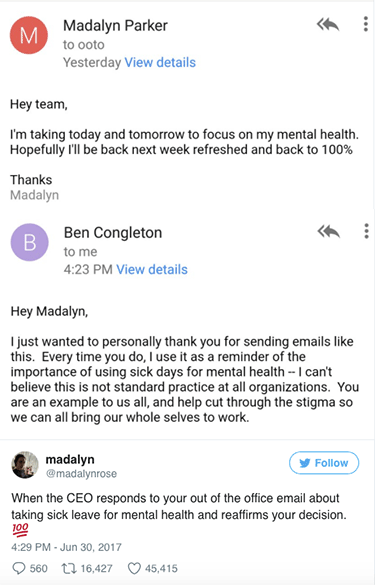 When Madalyn Parker, a web developer at Olark in Ann Arbor, Mich., emailed her co-workers to let them know she would be taking a few days off for her mental health, she never expected to hear from company CEO Ben Congleton. In a surprising move, he responded to thank Parker for helping to “cut through the stigma” of mental health. And when their dialogue went viral earlier this year, both Congleton and Parker inspired other companies to take a fresh look at how they address mental health on the corporate level.
When Madalyn Parker, a web developer at Olark in Ann Arbor, Mich., emailed her co-workers to let them know she would be taking a few days off for her mental health, she never expected to hear from company CEO Ben Congleton. In a surprising move, he responded to thank Parker for helping to “cut through the stigma” of mental health. And when their dialogue went viral earlier this year, both Congleton and Parker inspired other companies to take a fresh look at how they address mental health on the corporate level.
“From the very strong response to Madalyn’s tweet,” Congleton said, “it is clear that many employees still feel a strong stigma around discussing their mental health challenges at work.” He’d like to help to change that.

In an email interview, Congleton said that corporate America on the whole has failed to create an environment where the one in five Americans who face mental health challenges feel comfortable enough prioritizing their health at work. This can be especially true in the tech world where talking opening about issues related to anxiety or depression, for example, may be viewed as a sign of weakness or even a detriment to taking on big projects or being considered for promotions.
Congleton blames this on management. He believes company leaders not only need to change the way people talk about mental health at work, but also how they respond to it.
“For those us working in the IT industry and being paid for knowledge work,” he said, “it is especially important to work in environments where we can be honest and direct about our ability to operate at full capacity. In IT, one of the biggest challenges is having strong managers that maximize team performance by helping their teams bring their whole selves to work.”
He admitted that this can be quite challenging in an industry where most people are promoted based on technical aptitude, and rewards are doled out for meeting deadlines.
It’s a numbers-driven industry that can sometimes neglect much deeper issues that ultimately do affect productivity.
“I would like to see more employers have written mental health policies that make it clear that mental health is health, and using sick days to care for your mental health is encouraged,” Congleton said. “I would like to see more employers invest in training their managers to build high-performing, trusting teams.”
As CEO of Olark, Congleton, a new dad fresh from paternity leave, has helped to create an environment where the team knows he has their back. Parker’s viral tweet, he said, allowed him to use his own privilege to champion the openness around mental health, though he credits Parker for taking that first important step.
“Madalyn has helped normalize discussions around mental health, and definitely helped us create a more open, transparent and trusting environment where our teams bring their whole selves to work,” he explained. That the conversation went viral only seems to point to the fact that a conversation needs to happen at so many other companies within the industry.
Ignoring Mental Health Is Costly
According to Katrina Gay, the national director of strategic partnerships at the National Alliance for Mental Health (NAMI), employers actually play a huge role in how people feel at work, at home and in the community.
“Until recently,” she explained, “mental health has been a taboo subject to discuss openly in social conversation, due in large part, I think, to misunderstandings, stigma and fear of what we do not really know. Shame remains a prevalent component of the stigma, but we see evidence that that is changing.”
Through her work with NAMI, Gay acknowledges that addressing mental health on the job is actually good for everyone – from employers and managers to the bottom line. “Untreated mental health conditions,” she said, “cost the U.S. economy $200 billion in lost earnings each year through decreased work performance and productivity.”
Practically speaking, making smart changes to how mental health is addressed offers both employees and companies a far more successful standard from which to work, not to mention a lucrative one, even though challenges certainly do persist.
“Stigma, the hidden burden of mental health conditions, can be as hard to deal with as the condition itself,” said Gay. “It affects people’s well-being, prevents them from seeking treatment and is a barrier to recovery. Short-term disability claims for mental health conditions are growing 10% annually and can account for 30% or more of the disability burden for the typical employer.”
In an ideal corporate world, an employer would want to direct spending toward mental health services that treat issues rather than on disability or even training new employees to take over after the loss of valuable team members.
Ignoring Mental Health Is a Fatal Mistake
The good news for employers and employees alike is that most symptoms related to mental health conditions can actually improve with the proper support. Resources to assist employers are available online via the StigmaFree Company initiative. Tools include resources, assets and videos to inspire companies to develop their own recommendations, ensuring engagement can ultimately be congruent with the existing company culture.
For Felicia Johnson, an author, speaker and mental health advocate based in Atlanta, finding a voice for her own experiences as an abuse survivor has inspired her to talk openly about the stigma surrounding mental health, and why mental health services are critical for society. Armed with a background in psychology, she regularly tours the country talking about the dangers of not addressing mental health in the corporate world.
“Shame played a large part in my silence in the beginning before I learned how to help others,” she said. “I've spoken at places around the world and have heard countless numbers of stories from people who share the same concerns about these issues. The dangers of not addressing these issues can be fatal. That is the worst-case scenario.”
Johnson would like to see mental health addressed in the workplace much like cancer or diabetes, diseases that once carried their own stigmas until people became more informed about how they can be treated.
“Realistic ways that people in management can help mental health issues that arise,”
said Johnson, “is to start by educating themselves.” This means delving into the most common symptoms and learning how to talk to employees who may, for example, be experiencing stress, anxiety and depression.
Important Questions to Ask
Nancy W. Spangler, a senior consultant for the American Psychiatric Foundation’s Center for Workplace Mental Health, says there are many companies, like American Express, that have publicly reported how they have taken a more proactive approach to mental health. Spangler says these case studies can help other companies rethink policies.
American Express, for example, has adopted a more holistic approach to physical and mental health, according to the company’s global medical director Wayne Burton.
“I have always believed that physical and emotional wellbeing are equally important elements of a healthy workforce,” he said. “To truly care for our employees, I knew we needed to bring on a full-time mental health professional and create a dedicated program that complimented the healthcare benefits already available in our wellness centers.”
American Express says that there are actually a few important questions that all companies should be asking themselves when it comes to mental health, including:
- Does your organization screen for mental health conditions?
- Do you use aggregated, trend-level data to build a business case for focusing on mental health?
- Do you have a staff member dedicated to mental health promotion?
- Do you recruit leaders to talk openly about mental health and support services available through your company?
- Do you offer a variety of mental health supports and formats (e.g., learning and intervention programs available by phone or computer, mental health components added to other programs, such as fitness or chronic condition management)?
Spangler credits young people and tech startups with helping to advance this issue by “demanding work-life attention.” For example, Facebook recently hired a director from the Center for Workplace Mental Health to manage all of its own mental health programs. “Putting leaders in visible positions and having the conversations,” Spangler explained, “are two great first steps.” She also suggests providing training to managers about how to approach employees who may be having mental health issues on the job.
Create a Safe Space
At Olark, Congleton says that creating a safe space where teammates can be vulnerable with each other has really changed the company culture. It’s also been a particularly important step in helping employees bring their full selves to work.
“Think about a time you were unprepared for a meeting because you had to deal with a sick kid,” he said, “or didn't get enough sleep due to needing to care for a relative. Or perhaps you were burned out because a deadline you were working on bled into the weekend. One approach is to power through, pretend everything is OK. The other approach is to be honest and direct with your teammates. So many teams lack this openness and it results in mismatched expectations, communications bottlenecks and lack of trust.”
He said companies should start with the goal of building high-performing teams, and taking care of mental health becomes a natural extension of that goal. When Congleton studied research around building these kind of teams, he discovered that they all enjoy something in common – a high degree of psychological safety.
“Our openness around mental health is a bi-product of building a psychological safe space for our teams to flourish,” Congleton said. “I see a future where every team is a high-performing team, and talking about mental health is as easy as talking about the flu.”
Ready to upgrade your IT skills? We've got great news! You can save big on CompTIA certifications and training right now.
Natalie Hope McDonald is a writer based in Philadelphia.

